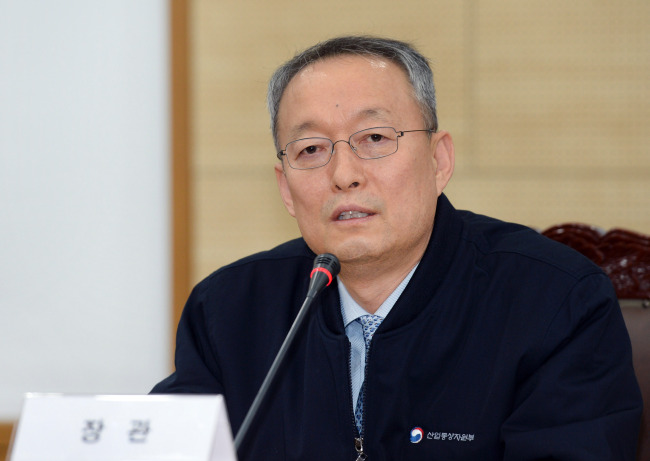Korea seeks to shift export strategy as US raises trade barriers
By YonhapPublished : Feb. 20, 2018 - 10:41
SEJONG -- South Korea should change its export strategy to expand its foothold in emerging markets and develop new growth drivers against a series of import restrictions by the United States, Seoul's commerce minister said Tuesday.
Paik Un-gyu, Minister of Trade, Industry and Energy, said South Korea should be strategic and nimble to manage potential risks from the rising protectionist trade policies under US President Donald Trump, including safeguard measures on washers and solar panels and proposed tariffs on steel imports.
"I personally think this may not be the end, with more to come. We have to change our export strategy to counter rising US trade protectionism," Paik said in a meeting with reporters. "To better manage risks down the road, we have to explore new markets and develop value-added products and innovative materials."

The US Department of Commerce on Friday recommended that Trump levy a tariff of 24 percent on all steel imports or a quota for steel imports of 63 percent of last year's level based on national security grounds, using the seldom-used Section 232 of the 1962 Trade Expansion Act.
Another option is levying a 53 percent tariff on steel imports from 12 countries including South Korea, Brazil and China.
"(Tariffs on steel) are part of Trump's policy aimed at his political supporters ahead of the November mid-term elections and for his second term for president," Paik said. "We'll have to overhaul our export strategy against protectionism."
The latest import restriction poses a double whammy to the South Korean economy as General Motors last week announced its plan to shut down its underutilized Korean plant by the end of May as part of broad restructuring program.
Paik said Seoul will consult with GM officials to discuss its business plans in South Korea before deciding on support measures. The policymaker said there is a need to consider the potential impact on the local economy, jobs and the ongoing talks to amend the free trade agreement between the two nations.
Auto issues were the top priority of the past two rounds of FTA negotiations, as Trump has complained about the rising US trade deficit in the auto sector and the shrinking number of American jobs.
"Nothing is unrelated now, including GM and steel (duties). We are taking a comprehensive approach," Paik stressed.
"GM can't take part in the FTA negotiations and that matter can't be put on the negotiating table, yet the issue could affect the FTA talks in terms of the auto industry," he said.
To provide support for GM Korea, Paik said the automaker should propose a long-term commitment and improve the transparency of its business management here.
"We are trying to stand in GM's shoes. As GM is a for-profit corporation, I think it would exit the Korean market if it expects any losses," he said. "Working-level talks are currently under way, but incentives for foreign companies investing here should be provided within the World Trade Organization's regulations."
While the bilateral trade deal has boosted auto trade between the two nations, South Korean companies have enjoyed greater benefits thanks to the bigger size of the US auto market, which is about 10 times bigger than in Asia's fourth largest economy.
South Korea's auto exports to the US jumped 80 percent from 2011 to $18.49 billion in 2015, while its imports of American-made cars soared 380 percent. (Yonhap)







![[Graphic News] More Koreans say they plan long-distance trips this year](http://res.heraldm.com/phpwas/restmb_idxmake.php?idx=644&simg=/content/image/2024/04/17/20240417050828_0.gif&u=)
![[KH Explains] Hyundai's full hybrid edge to pay off amid slow transition to pure EVs](http://res.heraldm.com/phpwas/restmb_idxmake.php?idx=644&simg=/content/image/2024/04/18/20240418050645_0.jpg&u=20240419100350)






![[From the Scene] Monks, Buddhists hail return of remains of Buddhas](http://res.heraldm.com/phpwas/restmb_idxmake.php?idx=652&simg=/content/image/2024/04/19/20240419050617_0.jpg&u=20240419175937)

![[KH Explains] Hyundai's full hybrid edge to pay off amid slow transition to pure EVs](http://res.heraldm.com/phpwas/restmb_idxmake.php?idx=652&simg=/content/image/2024/04/18/20240418050645_0.jpg&u=20240419100350)

![[Today’s K-pop] Illit drops debut single remix](http://res.heraldm.com/phpwas/restmb_idxmake.php?idx=642&simg=/content/image/2024/04/19/20240419050612_0.jpg&u=)